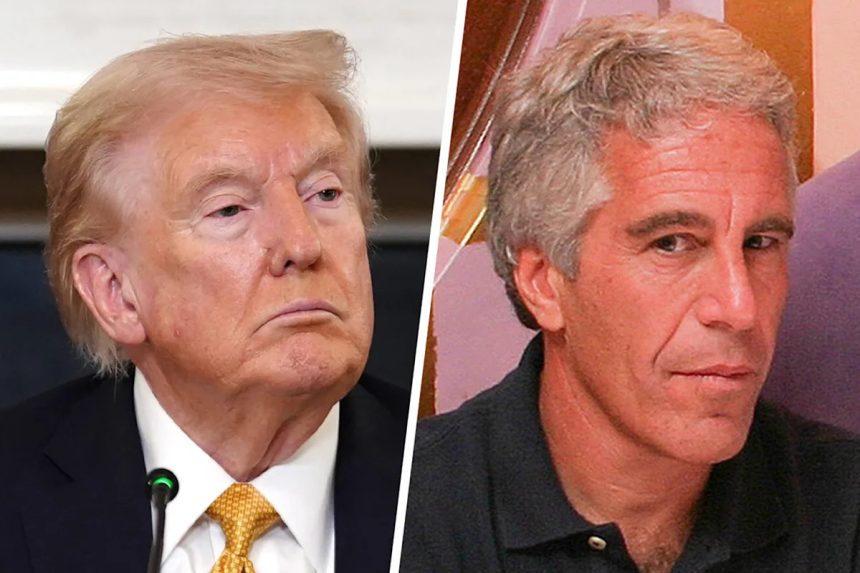As the bipartisan Epstein Files Transparency Act started to advance in the Republican-led House, Donald Trump and his team scrambled to derail the legislation that would force disclosure of the Jeffrey Epstein files. When those efforts fell short and it became clear that the measure would easily clear the lower chamber, the president executed a dramatic U-turn and encouraged allied GOP members to vote for the bill.
What he did not say was what he’d do if the bill reached his desk. On Monday afternoon, Trump answered that question, too. My MS NOW colleague Erum Salam reported:
President Donald Trump said Monday he will sign the bill to release all the government’s files related to convicted sex offender Jeffrey Epstein if Congress passes it. Asked in the Oval Office whether he would sign the bill if it came across his desk, Trump said, ‘Sure I would,’ adding that he thought it would do more damage to Democrats.
The Republican packaged his response as part of a larger pitch about how impressed he is with “the great success of the Republican Party,” concluding anew that he considers the Epstein scandal to be “a hoax.”
Trump’s comments came roughly 24 hours before the expected House vote on the bill, which is scheduled to reach the floor on Tuesday afternoon. The final tally is expected to be lopsided, if not unanimous, especially after the president gave Republicans cover to support it.
The White House line, however, comes with some fine print.
For one thing, as Trump almost certainly knows, after the House vote, the measure would head to the Republican-led Senate, where it faces an uncertain future. Not only have GOP leaders refused to commit to bringing the resolution to the floor for consideration, but it would also need 60 votes to advance in a chamber where the Senate Democratic conference has 47 members.
Put another way, it’s easy for the president to say he’s willing to sign a bill when he also recognizes that there’s a good chance the bill will never reach his desk.
What’s more, there are legal considerations to keep in mind. Republican Rep. Thomas Massie of Kentucky, who helped spearhead the Epstein discharge petition, warned on Monday night that new Trump-directed Justice Department probes into Epstein’s ties could interfere with disclosures.
“I’m concerned that now he’s opening a flurry of investigations, and I believe they may be trying to use those investigations as a predicate for not releasing the files. That’s my concern,” Massie told reporters outside the Capitol.
“I’m afraid they’re going to try to use a provision of the law that allows you not to release these materials if they’re the subject of an ongoing investigation and would harm — the release of which would harm the ongoing investigation,” the congressman added.
But hanging overhead is one nagging detail the White House has largely ignored: The president is encouraging the House to approve a resolution to force the disclosure of materials that Trump could simply choose to disclose at any time. As The New York Times explained:
Mr. Trump’s sudden reversal raises a question: If the president agrees that more investigative materials in the Epstein case should be released, why is he waiting for the passage of the so-called discharge petition to do so? Why doesn’t he immediately order Attorney General Pam Bondi to make the documents public? The fact is that if Mr. Trump chooses to, he can indeed order more files released — with or without legislation — much as he did in other cases of intense public interest, including the killings of the Rev. Dr. Martin Luther King Jr. and President John F. Kennedy.
The White House has repeatedly insisted that the administration has disclosed 50,000 pages of documents related to the Epstein case. That’s true. But as the Times report added, a federal judge has said there are “more than 100,000 pages of files and materials related to the Justice Department’s investigation into Mr. Epstein, and the Justice Department has confirmed that it possesses more than 300 gigabytes of data and physical evidence, including files that must be withheld.”
In other words, there’s a lot more the president and his team could do on the transparency front, but they haven’t done it.
On Capitol Hill, the pending Epstein Files Transparency Act would compel Trump’s Justice Department to publicly disclose “all unclassified records, documents, communications and investigative materials,” including “records relating to Epstein’s detention and death; flight logs of aircraft owned or used by Epstein; individuals named in connection with Epstein’s criminal activities, civil settlements, or immunity or plea agreements; immunity deals, sealed settlements, or plea bargains of Epstein or his associates; entities with ties to Epstein’s trafficking or financial networks; and internal Justice Department communications concerning decisions to investigate or charge Epstein or his associates.” Watch this space.
This article was originally published on MSNBC.com









